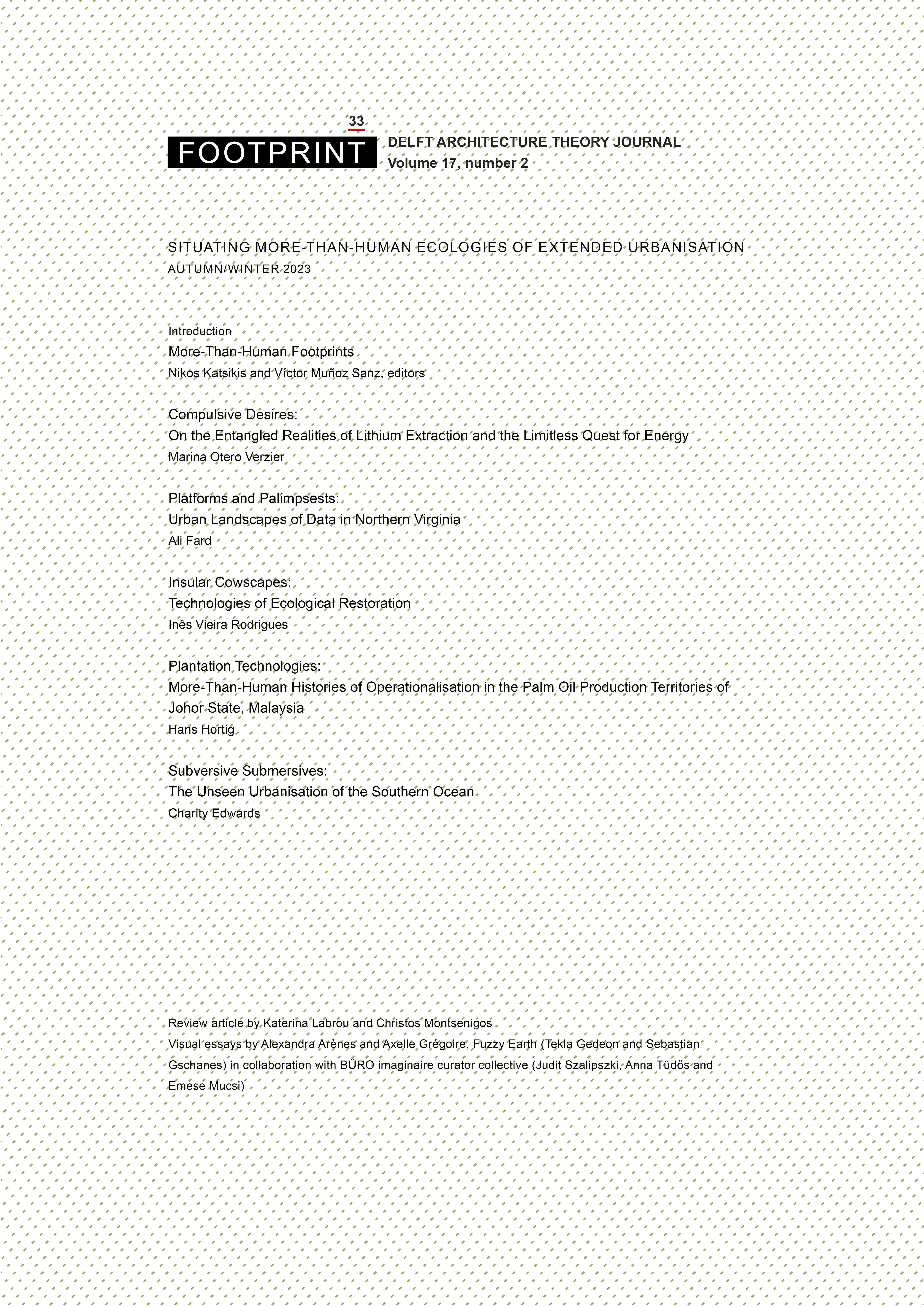Platforms and Palimpsests
Urban Landscapes of Data in Northern Virginia
DOI:
https://doi.org/10.59490/footprint.17.2.6726Abstract
Data platforms increasingly mediate the relationship of society to the data it produces and therefore form a critical layer of the contemporary link between data and urbanisation. However, the current discussion of the impact of data platforms on urbanisation is limited on one hand by an overly metaphoric articulation of platforms, which obscures the material geographies and infrastructural landscapes of data production; and on the other hand, by an administratively bounded reading of platforms, which confines the discussion to only their most visible impact in cities. In this article I argue that to fully capture the impact of platforms on urbanisation we need to overcome these limitations by examining the ‘operational landscapes’ of data production and circulation. This extended ontology of platforms positions the spatial discourse of technology in relationship with other forms of capitalist spatial production and opens up the material geographies and infrastructural landscapes of data production for critical engagement as integral parts of the sociotechnical construction of platforms. By examining the data landscapes of Northern Virginia, I illustrate how historic and contemporary forces, actor networks, and urban dynamics contribute to the construction and maintenance of the extended geography of data platforms.
References
Amazon Web Services. “AWS Cloud Computing for Federal Government,” n.d. https://aws.amazon.com/federal/.
———. “AWS Economic Impact Study: AWS Investment in Virginia,” 2021. https://d1.awsstatic.com/WWPS/pdf/aws-economic-impact-virginia.pdf.
Anderson, Sven, Alan Butler, David Capener, Donal Lally, Clare Lyster, and Fiona McDermott. States of Entanglement: Data in the Irish Landscape. Printed. New York: Actar Publishers, 2021.
Angelo, Hillary, and David Wachsmuth. “Urbanizing Urban Political Ecology: A Critique of Methodological Cityism.” International Journal of Urban and Regional Research 39, no. 1 (January 2015): 16–27. https://doi.org/10.1111/1468-2427.12105.
Barns, Sarah. Platform Urbanism. Singapore: Springer Singapore, 2020. https://doi.org/10.1007/978-981-32-9725-8.
Bhageshpur, Kiran. “Data Is the New Oil – and That’s a Good Thing.” Forbes, November 2019. https://www.forbes.com/sites/forbestechcouncil/2019/11/15/data-is-the-new-oil-and-thats-a-good-thing/?sh=5c8f48873045.
Blanchette, Jean-François. “From Digital Exceptionalism to Computational Scarcity.” In Geographies of Information (NG7), edited by Ali Fard and Taraneh Meshkani, 21–27. Cambridge MA: Harvard University Press, 2015.
Bowker, Geoff. Memory Practices in the Sciences. Cambridge MA: MIT Press, 2005.
Bratton, Benjamin. The Stack: On Software and Sovereignty. Cambridge MA: MIT Press, 2015.
Brenner, Neil. “Theses on Urbanization.” Public Culture 25, no. 1 (2013): 85–114. https://doi.org/10.1215/08992363-1890477.
Brenner, Neil, and Nikos Katsikis. “Operational Landscapes: Hinterlands of the Capitalocene.” Architectural Design 90, no. 1 (January 2, 2020): 22–31. https://doi.org/10.1002/ad.2521.
Brenner, Neil, and Christian Schmid. “The ‘Urban Age’ in Question.” International Journal of Urban and Regional Research 38, no. 3 (May 2014): 731–55. https://doi.org/10.1111/1468-2427.12115.
Caprotti, Federico, I.-Chun Catherine Chang, and Simon Joss. “Beyond the Smart City: A Typology of Platform Urbanism.” Urban Transformations 4, no. 1 (December 2022): 4. https://doi.org/10.1186/s42854-022-00033-9.
Carrière-Swallow, Yan, and Vikram Haksar. “The Economics and Implications of Data: An Integrated Perspective.” International Monetary Fund, 2019. https://www.imf.org/en/Publications/Departmental-Papers-Policy-Papers/Issues/2019/09/20/The-Economics-and-Implications-of-Data-An-Integrated-Perspective-48596.
Castells, Manuel, and Peter Geoffrey Hall. Technopoles of the World: The Making of Twenty-First-Century Industrial Complexes. London ;New York: Routledge, 1994.
Castells, Manuel. The Urban Question: A Marxist Approach. Cambridge, MA: MIT Press, 1979.
Ceruzzi, Paul E. Internet Alley: High Technology in Tysons Corner, 1945-2005. Cambridge, Mass: MIT Press, 2008.
Chazan, Guy. “Data Is the New Oil . . . Who’s Going to Own It?” Financial Times, November 2016. https://www.ft.com/content/e548deac-856a-11e6-8897-2359a58ac7a5.
Easterling, Keller. Extrastatecraft: The Power of Infrastructure Space. London and Brooklyn: Verso, 2014.
Fard, Ali. “Not Sharing: Urban Techno Colonialism in the Age of Big Data.” PLAT 7 (2018): 249–56.
Friedman, Andrew. Covert Capital: Landscapes of Denial and the Making of U.S. Empire in the Suburbs of Northern Virginia. American Crossroads 37. Berkeley: University of California Press, 2013.
Gandy, Matthew. “Cyborg Urbanization: Complexity and Monstrosity in the Contemporary City.” International Journal of Urban and Regional Research 29, no. 1 (2005): 26–49.
Garreau, Joel. Edge City: Life on the New Frontier. 1. Anchor Books ed., 6. print. New York, NY: Anchor Books, 1992.
Gitelman, Lisa. Raw Data Is an Oxymoron. Cambridge MA: MIT Press, 2013.
Harvey, David. “Globalization and the ‘Spatial Fix.’” Geographische Revue 3, no. 2 (2001): 23–30.
Harwood, Herbert H. Rails to the Blue Ridge: The Washington and Old Dominion Railroad, 1847-1968. 3rd ed. Fairfax Station, Va.: Northern Virginia Regional Park Authority, 2000.
Herrman, John. “Platform Companies Are Becoming More Powerful – But What Exactly Do They Want?” The New York Times Magazine, March 21, 2017. https://nyti.ms/2nvlSHm.
Holt, Jennifer, and Patrick Vonderau. “‘Where the Internet Lives:’ Data Centers as Cloud Infrastructure.” In Signal Traffic: Critical Studies of Media Infrastructures, edited by Lisa Parks and Nicole Starosielski, 71–93. Chicago, IL: University of Illinois Press, 2015.
Jasanoff, Sheila. “Future Imperfect: Science, Technology, and the Imaginations of Modernity.” In Dreamscapes of Modernity: Sociotechnical Imaginaries and the Fabrication of Power, edited by Sheila Jasanoff and Sang-Hyun Kim, 1–33. Chicago and London: The University of Chicago Press, 2015.
Kargon, Robert, and Arthur P. Molella. “The City as Communications Net: Norbert Wiener, the Atomic Bomb, and Urban Dispersal.” Technology and Culture 45, no. 4 (2004): 764–77. https://doi.org/10.1353/tech.2004.0190.
Lang, Robert. Edgeless Cities: Exploring the Elusive Metropolis. Brookings Metro Series. Washington, D.C: Brookings Institution Press, 2003.
Life. “How U.S.Cities Can Prepare for Atomic War: MIT Professors Suggest a Bold Plan to Prevent Panic and Limit Destruction.” December 18, 1950.
Mattern, Shannon. “A City Is Not a Computer.” In A City Is Not a Computer: Other Urban Intelligences, 51–72. Princeton, NJ: Princeton University Press, 2021.
Mauldin, Alan. “Rising Tide: Content Providers’ Investment in Submarine Cables Continues.” TeleGeography Blog, 2016. https://blog.telegeography.com/rising-tide-content-providers-investment-in-submarine-cables-continues.
Mekouar, Dora. “Here’s Where the Internet Actually Lives.” Voice of America, February 11, 2020. https://www.voanews.com/a/usa_all-about-america_heres-where-internet-actually-lives/6184090.html.
Mörtenböck, Peter, and Helge Mooshammer, eds. Platform Urbanism and Its Discontents. Rotterdam: nai010, 2021.
National Landing. “Progress to the Tune of Billions of Dollars,” n.d. https://nationallanding.org/our-downtown/transformation.
Northern Virginia Technology Council. “The Impact of Data Centers on the State and Local Economies of Virginia,” March 2022. https://www.nvtc.org/NVTC/Workforce/Resource_Library_Docs/2022_NVTC_Data_Center_Report.aspx.
Parikka, Jussi. A Geology of Media. Minneapolis, MN: University of Minnesota Press, 2015.
Sadowski, Jathan, and Roy Bendor. “Selling Smartness: Corporate Narratives and the Smart City as a Sociotechnical Imaginary.” Science, Technology, & Human Values 44, no. 3 (May 16, 2019): 540–63. https://doi.org/10.1177/0162243918806061.
Schwab, Klaus, Alan Marcus, Justin Rico Oyola, and William Hoffman. “Personal Data: The Emergence of a New Asset Class.” The World Economic Forum, 2011. https://www.weforum.org/reports/personal-data-emergence-new-asset-class.
Schweitzer, Ally. “The Pandemic Is Driving A Data Center Boom In Northern Virginia.” NPR, March 26, 2021. https://www.npr.org/local/305/2021/03/26/981557613/the-pandemic-is-driving-a-data-center-boom-in-northern-virginia.
Srnicek, Nick. Platform Capitalism. Cambridge UK: Polity Press, 2017.
Starosielski, Nicole. The Undersea Network. Durham and London: Duke University Press, 2015.
Taffel, Sy. “Data and Oil: Metaphor, Materiality and Metabolic Rifts.” New Media & Society, June 3, 2021, 146144482110178. https://doi.org/10.1177/14614448211017887.
The Center for Land Use Interpretation. “8100 Boone Blvd. Data Center, Virginia,” n.d. https://clui.org/ludb/site/8100-boone-blvd-data-center.
The Economist. “Clicking for Gold.” 2010. http://www.economist.com/node/15557431.
The Economist. “The World’s Most Valuable Resource Is No Longer Oil, but Data.” May 2017. https://www.economist.com/leaders/2017/05/06/the-worlds-most-valuable-resource-is-no-longer-oil-but-data.
Toonders, Joris. “Data Is the New Oil of the Digital Economy.” Wired, July 2014. https://www.wired.com/insights/2014/07/data-new-oil-digital-economy/.
Tysons Corner Center. Brand Opportunities, n.d. https://www.tysonscornercenter.com/BrandOpportunities.
US Census Bureau. “Median Household Income in the Past 12 Months,” 2020. https://data.census.gov/cedsci/table?q=B19013.
Wirth, Louis. “Urbanism as a Way of Life.” American Journal of Sociology 44, no. 1 (July 1938): 1–24. https://doi.org/10.1086/217913.
Zuboff, Shoshana. “Big Other: Surveillance Capitalism and the Prospects of an Information Civilization.” Journal of Information Technology 30, no. 1 (March 2015): 75–89. https://doi.org/10.1057/jit.2015.5.
Downloads
Published
Issue
Section
License
Copyright (c) 2024 Ali Fard

This work is licensed under a Creative Commons Attribution 4.0 International License.
- Authors retain copyright and grant the journal right of first publication with the work simultaneously licensed under a Creative Commons Attribution License that allows others to share the work with an acknowledgement of the work's authorship and initial publication in this journal.
- Authors are able to enter into separate, additional contractual arrangements for the non-exclusive distribution of the journal's published version of the work (e.g., post it to an institutional repository or publish it in a book), with an acknowledgement of its initial publication in this journal.





